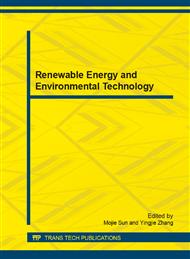p.4504
p.4508
p.4514
p.4520
p.4524
p.4530
p.4536
p.4544
p.4548
Based on Decoupling Model Study Low-Carbon Economic Development in Tianjing Industry
Abstract:
Based on the elastic decoupling analysis framework, using the IPCC recommended the calculation method of the carbon dioxide and LQ, calculated Tianjin industrial emissions of carbon dioxide from 2000 to 2010.It creatively brings in the industry cluster elastic decoupling factor, builds a new elastic decoupling causality chain and analyzes the relationship among the factors in the chain. It is that Tianjin industrial decoupling elastic strength followed by decoupling industrial cluster elasticity, decoupling emission elasticity, energy decoupling of flexibility. Decoupling of energy consumption flexibility in addition to the 2009-2010 after expanding hook and expand outside connection, is weak. Decouple emission elasticity, except for expansion after 2001 hook, the rest are in strong decoupling or weak decoupling. Industrial cluster elastic appear fluctuation condition, the overall trend to strong decoupling for weak decoupling, industrial concentration degree increases, the industry growth obvious advantages, the scale showed a trend of fluctuations decrease, manifests the high and new technology's influence on the industrial cluster development. According to the results of research, Tianjin industrial low carbon routing and the relevant countermeasures will be promoted.
Info:
Periodical:
Pages:
4524-4529
Citation:
Online since:
October 2013
Authors:
Price:
Сopyright:
© 2014 Trans Tech Publications Ltd. All Rights Reserved
Share:
Citation:


